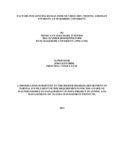| dc.contributor.author | TUMWINE, MONICA NYANKUMARE | |
| dc.date.accessioned | 2019-09-10T09:26:07Z | |
| dc.date.available | 2019-09-10T09:26:07Z | |
| dc.date.issued | 2012 | |
| dc.identifier.citation | Tumwine, Monica Nyankumare (2012) Factors Influencing Human Immune Virus (HIV)ntesting amongst Students at Makerere University | en_US |
| dc.identifier.uri | https://hdl.handle.net/20.500.12305/563 | |
| dc.description.abstract | This research assessed the factors influencing HIV testing among students at Makerere
University. The objectives of the study included stigma, confidentiality and beliefs as
independent variables and HIV testing as a dependent variable. A cross sectional design was
chosen for this study so as to determine the factors influencing HIV testing among students at
Makerere University. Using simple random sampling and purposive sampling respondents were
chosen to represent the entire population. Data were collected from Lumumba and Mary Stuart
Halls of residence where a combination of quantitative and qualitative data collection methods
were used. Self administered questionnaires were used to collect quantitative data; Focus Group
Discussions (FGDs), Key Informant Interview were also used to collect qualitative data. Data
were analyzed using STATA and was entered using ACCESS. It was found out that 125 (40%)
of the students admitted never to have taken an HIV test before and therefore, they did not know
their status. Of the 182 (60%) who tested, 9% did not receive their results. It was found out that
stigma positively affects students to test for HIV; with only 141 (45%) of the students willing to
disclose their results to other people. Confidentiality positively influences students to test with
53% agreed that health workers keep confidentiality of their information. With beliefs, 10%
believed that HIV is for immoral people. In addition, Logistic regression was used for statistical
analysis where for stigma a P-value of 0.04 was got, confidentiality a P-value of 0.02 and beliefs
a P-value of 0.04 was got where by P-value of less than 0.05 shows that the dependent variable is
significantly affected by the independent variables. The findings from the study were expected to
help decision makers especially NGO’s, policy makers, to understand the factors influencing
students to test for HIV and further help them design HIV policies to help students test for HIV. | en_US |
| dc.language.iso | en | en_US |
| dc.publisher | Uganda Management Institute | en_US |
| dc.subject | Factors Influencing | en_US |
| dc.subject | Human Immune Virus (HIV) Testing | en_US |
| dc.subject | Students | en_US |
| dc.subject | Makerere University | en_US |
| dc.title | Factors influencing human immune virus (hiv) testing amongst students at Makerere university | en_US |
| dc.type | Thesis | en_US |

